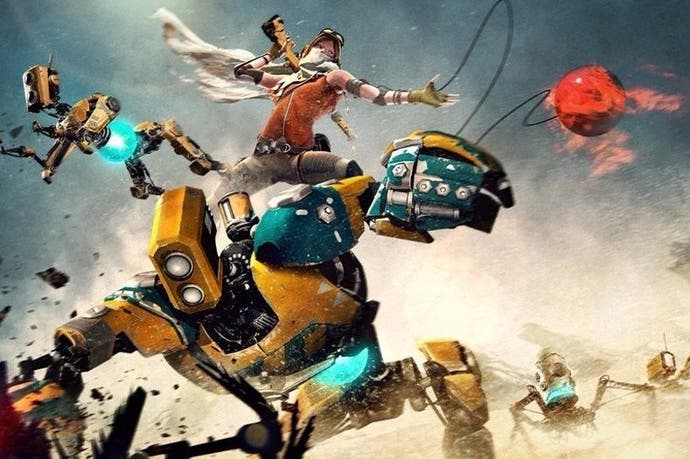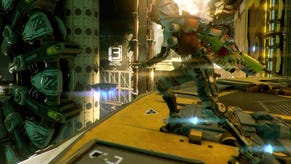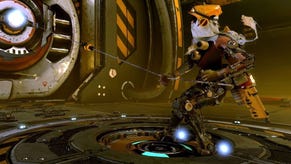Recore review
Joules burn.
They don't make them like this so much anymore. Recore, a spirited action adventure from a chaos of developers assembled by Microsoft Game Studios, is what was once known as a double-A game - sitting somewhere behind the big budget blockbusters and before indie was really a thing, they were games that made up for their lack of clout by a certain pluckiness. Games such as Psi-Ops and Metal Arms: Glitch in The System were standouts in the PS2 day when your local CEX would be full of such offbeat treasures; today, Recore stands almost entirely alone in lands as deserted as its own Far Eden.
The talent behind this one is a bunch so diverse, eccentric and divisive it feels like Microsoft's tried to get together video game development's answer to the A-Team. Keiji Inafune, fresh from the infamy of Mighty No. 9, gets a production credit while his Comcept studio is put to work, Microsoft lends Joseph Staten for his first big writing gig since seeing much of his story for Destiny jettisoned at Bungie while Armature - an Austin studio formed by veterans of the Metroid Prime series - is also involved. Heck, even Asobo, the French studio responsible for the gloriously ambitious (and hugely flawed) Fuel is in on the act with this one. As mid-tier games go, Recore's got an all-star cast.
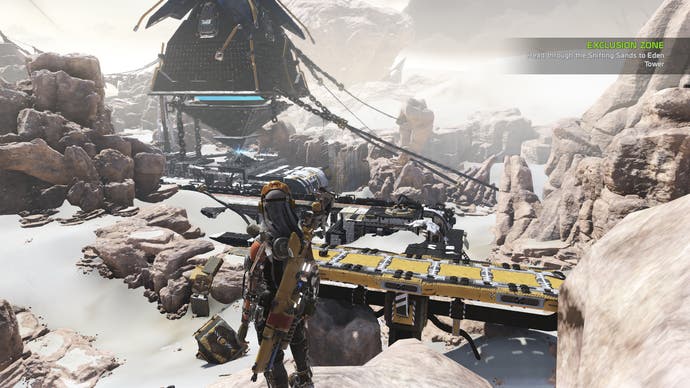
You're Joules, a would-be colonist of distant planet Far Eden who wakes up from cryosleep to find her fellow settlers depleted in number and scattered across the sands while rogue bots stalk the lands. It's hardly an original set-up, but it does at least plunder from elsewhere with a spring in its step. Perhaps you can thank Staten's presence, with Recore sharing with classic Halo the same appetite for pulpy sci-fi told with puppy dog enthusiasm; Joules herself is a lightly sketched out yet endearingly upbeat lead, while Far Eden itself is a captivating sprawl, full of mysteries secreted under its baking sands.
Armature's done the bulk of the heavy lifting here, and that shows in Recore's make-up. A series of small, interconnected open worlds play host to dungeons, collectibles and, of course, plenty of hidden alcoves that host power-ups and and tech. It's Metroid Prime hazily rewritten, those secrets not quite so elegantly hidden and the gear-gating that little bit blunter than it was in the GameCube classic. Still, you can feel some of that heritage in Far Eden's far-flung corners, and it's there too in its sense of lonely adventure. Recore's smart not to hold your hand too much, and it's at its very best when you stumble upon one of its optional treats; grand traversal puzzles springing from the sands that ask you to string together strings of jumps and dashes, or combat arenas that pound you with high level enemies.
Recore's gunplay, too, carries a little of Metroid Prime about it, only here it's been jacked up to an enjoyable degree. Fights are pieced together with auto-locking, boost-strafing and charged shots, while a simple colour matching system asks you to change weapons on the fly. Slow-moving and well-telegraphed attacks giving you ample space to dance between walls of bullets and pulsing lasers in what quickly become challenging encounters. It's satisfying stuff, emboldened by a literal push me pull you mechanic as you're able to tether the core of enemy bots once you've whittled down their healthbars to a certain degree, pulling at their core in a small tug of war that can provide an abrupt and exhilarating climax to a fight if executed correctly. Combat in Recore can be a joy, and it comes with a surprisingly stubborn edge - perhaps it's Inafune's touch and the legacy of Mega Man that's found its way into the one-shot kills and exacting scraps that come in the latter half of this game.
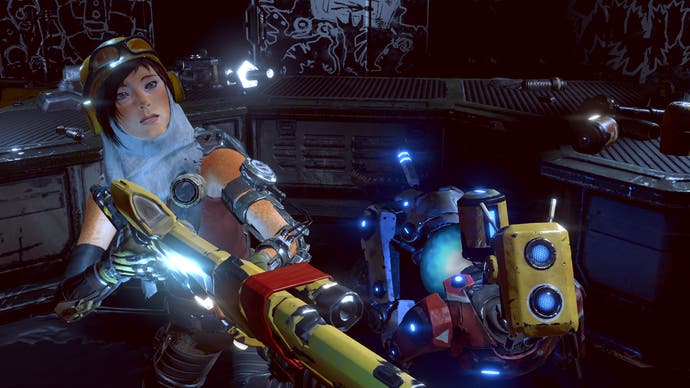
Recore's mechs certainly wouldn't look out of place in Mega Man either, aggressively anthropomorphised buckets of servos and gears that whir and beep with real character. It's where you'll find the game's real stars - Seth, the spider-like mech that clambers up panels in an arachnid take on Metroid's morph ball, Duncan the gorilla-esque bruiser or Violet, the chirpy ninja-styled mech that hosts every fast travel point. The mechs are the heart of Recore, so it's disappointing that in play they feel sidelined and anaemic.
Maybe it wasn't always that way. Recore has an in-depth crafting and upgrade system - crates and enemies explode with colourful loot that you can take back to your base to create new parts - but it's tied entirely to the mechs themselves, who feel totally ineffective in battle, rendering it all utterly pointless. It's an odd decision, and not Recore's only one. The latter half of the game gives way to a laborious fetch quest that gets further and further out of hand. There's a decent four-hour game in Recore somewhere, and it feels like it's sabotaged its efforts in padding out its length.
It's sabotaged, too, by a litany of technical problems. Loading times are absurdly long on Xbox One, while the PC version might be blessed with better technical performance but it's still plagued by flaws; characters getting stuck in doorways forcing a reset, or the fast travel map rendering itself completely useless thanks to a crosshair going AWOL, forcing you to backtrack on foot at an agonisingly slow pace until the problem magically rights itself.
A shame, as there's much to enjoy about Recore, an unpretentious throwback to a different age that's got a spark and character that's entirely its own. Scratch away at its slightly flakey surface and you can see all that enviable legacy of its developers crashing together in surprising, often delightful ways. Recore's got plenty of heart, but it's ultimately not enough to salvage it from its many problems.
